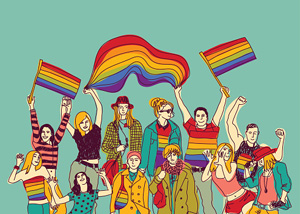
AACRAO's Student Identity Workgroup has released a report with guidance for AACRAO members and their institutions on serving transgender students and students who wish to update their gender marker, change their legal name, use a preferred name, or designate a pronoun. The paper includes stories from transgender students, practical
steps for administrators, guidance for student information system (SIS) and Client Relationship Management (CRM) vendors, and legislative next steps for local, state, and the federal government. The Work Group was also charged with developing guidance on appropriate methods of collecting, recording, and reporting of name and gender identity in student record systems, addressing practices in the student admissions process as well as those in student records and registration and other campus offices including but not limited to student financial aid, identity management (CIO), student housing, and student life.
Below are stories from students. Find a link to the full white paper at the end of this excerpt.
E
Their classes weren’t that hard, but E was exhausted. They identified as non-binary and found they were struggling each day to find their place in a very gender binary campus. Some of E’s professors were trying to use “they/them”
pronouns, but most didn’t bother to try any more. E’s birth name was regularly used by everyone from their instructors to the student worker who welcomed them to the dining hall each day. After a particularly trying day, E returned
to their dorm to find new door decorations up. There was their birth name right on their door!
MILLA
Milla felt like she had a cloud over her head. Since she’d come out as transgender to her family last summer, her parents would have nothing to do with her. They had stopped sending tuition payments and Milla was regularly getting notifications
from the Bursar’s Office. She had an apartment, but didn’t have the money to pay next month’s rent. She hadn’t eaten a full meal in days. She was trying to get a job, but her state did not have laws prohibiting discrimination
based on gender identity. She’d been turned away by two jobs already. She was scared. She had nowhere to turn.
SASHA
Sasha was a proud transwoman. She came out during her freshman year of college and found support through the LGBTQ+ Center on her campus. She went to the Registrar’s Office to change her records in the student information system, but soon
learned it wouldn’t be as easy as she’d hoped. The Registrar’s Office required legal documentation to update school records. Sasha tried to explain she didn’t have the $300 to do a legal name change right now, nor the
money to see a therapist and doctor to verify her change in gender. She had done so much to live as her true self, now she felt she was forced back into the closet each time she received a notification from school, logged on to check her
grades or had to provide her email address, which included her legal name.
FRED
Fred was attempting to apply to college. He’d completed the application for admission using his lived name and gender. That’s when the trouble started. Fred continued getting notifications about missing documents, even though he’d sent
his transcripts and standardized test scores. He’d called the admissions office to let them know they would be under a different name, but he was still having trouble. Problems continued as he tried to submit his FAFSA. Did he need to
register for Selective Service? What name should he list? It all became too much. Fred decided to work for a while instead of going to college.
MARK
As Mark was entering college as a female to male transgender student, he was able to contract for a spot in a male dorm. Since there were no gender inclusive or LGBTQ+-focused options, he was just happy he didn’t have to live in a female dorm.
He quickly found there were some issues with his new housing arrangement. He became even more dysphoric about his body. Living with all guys, he felt his chest was even more noticeable than ever. He started wearing his binder 24 hours a day.
He was having pain in his ribs, but he didn’t want to not appear “flat”. Showers were a whole different issue. His floor had community bathrooms and the shower curtains were just flimsy plastic. He was too scared to take a
shower, thinking someone would see his body. Mark’s health and hygiene, not to mention his relationships with his floormates, were eroding quickly.
ANDRE
Andre felt a little shaky as he approached the LGBTQ+ Campus Welcome Program. He’d known for sometime the way he felt in his heart didn’t connect to the outward male appearance he expressed. He hadn’t made many friends in the first few
weeks of school, hadn’t made it to most of his classes, and had been depressed and withdrawn for the last year. He only came to college because his mom dropped him off at his dorm, despite his complaints. It had taken a lot to get himself
up, dressed and out of his room to this moment, but his resident assistant had really talked it up and encouraged him to give it a try. As Andre walked into the event, he felt a warmth surround him. He was welcomed by staff and fellow
students; one of his professors was even there! His resident assistant waved him over to join a board game with a group from his floor. A staff member from the LGBTQ+ Center asked him his name and pronouns. “Andrea. She/her/hers."
Read the full report here.